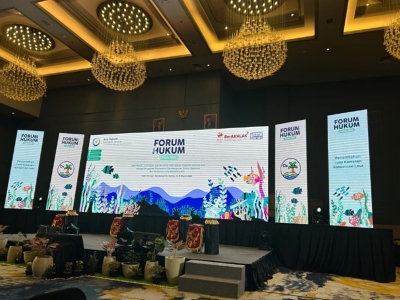Plastic Waste Invades Sea, Prof Hefni Effendi: KKP Needs to Make Regulations

Worldwide, one million plastic bottles are bought every minute. Five trillion plastic bags are used worldwide every year. In total, half of all plastic produced is designed for single use (used only once, then thrown away).
This was revealed in the ‘Interactive Discussion on Legal Support in Achieving the Priority Program of the Ministry of Marine Affairs and Fisheries (KKP) as a Driver for the Acceleration of Sustainable Maritime and Fisheries Sector Development’, some time ago. Present at this forum, Head of the Department of Aquatic Resources Management (MSP), Faculty of Fisheries and Marine Sciences (FPIK) IPB University, Prof Hefni Effendi.
“Based on the United Nations Environment Program (UNEP) and The World Counts, currently, we produce around 400 million tons of plastic waste every year,” said Prof Hefni.
The IPB University Professor added, the existence of the Great Pacific Garbage Patch floating in the northern part of the Pacific Ocean, which weighs up to 7 million tons with an area about twice the size of the state of Texas, astonishes the world in combating the release of plastic into terrestrial and marine environments.
“It is estimated that 80 percent of plastic comes from land, floating in rivers and being carried by currents to the sea. As much as 20 percent of plastic comes from oil platforms and ships. Scientific research from the Scripps Institution of Oceanography in California, United States (US) shows that 5 to 10 percent of fish contains small pieces of plastic,” he said.
How about in Indonesia? Prof Hefni said, citing data from the Statistics Indonesia (BPS), plastic waste in Indonesia reaches 64 million tons per year. As many as 3.2 million tonnes of which is plastic waste dumped into the sea. About 60-90 percent of the waste that is scattered in the sea is plastic waste, mainly plastic straws, glass drinks and plastic bags.
“In mountains, forests, villages, cities and at sea, we are being attacked by uncontrolled plastic waste. Many reports from the mass media say that the mangrove ecosystem is damaged not only because of the change of function, but because the regeneration of mangrove plants is hindered by the invasion of plastic waste,” he explained.
He explained that the Indonesian government had formulated several policies for handling plastic waste, like reducing 70 percent of plastic waste in the sea, for example. This has become a work program that is realized through the document National Action Plan (RAN) for Handling Marine Plastic Waste for 2018-2025, Presidential Regulation No. 83 of 2018 concerning Marine Waste Management and Decree of the Coordinating Minister for Maritime Affairs No. 69 of 2019 concerning the Team for Implementing the National Action Plan Marine Debris Handling.
“However, there are no more technical regulations regarding the handling of plastic waste in the sea. Therefore, regulations regarding the handling of plastic waste and other waste in the sea need to be formulated immediately with the involvement of a number of stakeholders,” said Prof Hefni.
The stakeholders he refers to include the government, the plastics industry, coastal and marine-based businesses, fishing communities, sea transportation, academics, non-governmental organizations and others.
“Thus, the aspects of being regulated will be more comprehensive. What’s more, it turns out that the source of plastic pollution actually comes from terrestrial sources,” suggested Prof Hefni Effendi.
In addition, due to the massive plastic waste problem, UNEP will draft a legally binding global agreement at the end of 2024. Prof Hefni hopes that a legally binding instrument will emerge from him, which will reflect various alternatives for handling plastic.
“The draft treaty at a macro level will cover the full life cycle of plastics, the design of products and materials that can be reused and recycled, and the need to increase international cooperation to facilitate access to technology, capacity building and scientific and technical cooperation,” he added. (HEF/Rz) (IAAS/MFR)



